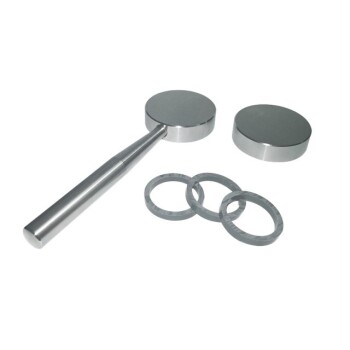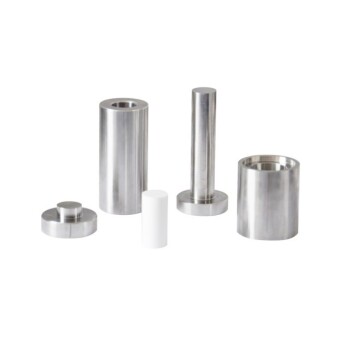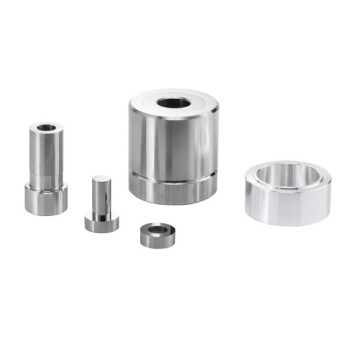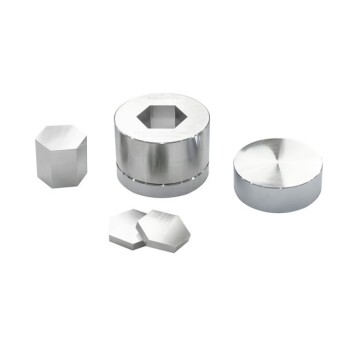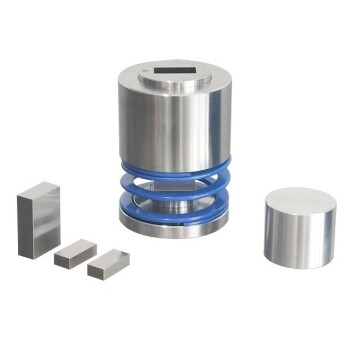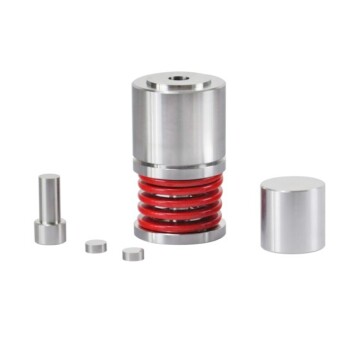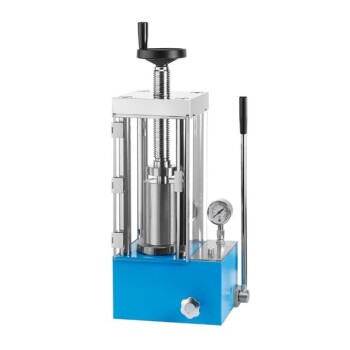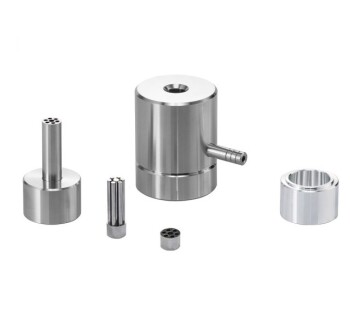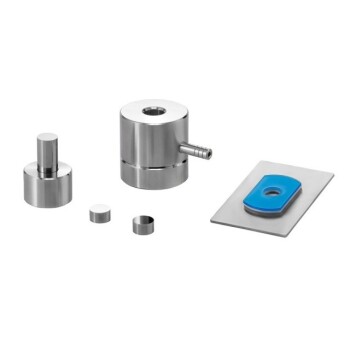At its core, a laboratory pellet press is a specialized tool used to convert powdered or granular material into a solid, uniform disc or pellet. This is done for two primary reasons: to prepare consistent samples for analytical techniques like spectroscopy and to test a material's physical properties under compression.
The fundamental challenge in many scientific fields is that raw powders are inconsistent, making them difficult to measure and analyze reliably. A pellet press solves this by transforming that loose material into a standardized, dense solid, which is the cornerstone for obtaining accurate data in both analytical chemistry and materials science.

The Primary Function: Sample Preparation for Analysis
The most common use of a lab press is to create ideal samples for sophisticated analytical instruments. The quality of the analysis is entirely dependent on the quality of the sample.
Why Uniform Pellets Are Crucial for Spectroscopy
Spectroscopic techniques like FTIR (Fourier-Transform Infrared) and XRF (X-ray Fluorescence) work by directing a beam of energy at a sample and measuring the response.
A loose powder has an uneven surface that scatters the beam unpredictably, leading to noisy and inaccurate results. By compressing the powder into a dense, flat pellet, you create a perfectly smooth and homogenous surface, ensuring the instrument delivers clean, reproducible data every time.
Preparing Samples for Microscopy and Diffraction
Techniques like SEM (Scanning Electron Microscopy) and XRD (X-ray Diffraction) also benefit immensely from well-prepared pellets.
Creating a dense pellet is the first step before a sample can be polished for microscopic imaging or analyzed for its crystalline structure. This ensures the data reflects the true nature of the material, not just surface imperfections.
The Second Function: Testing Material Properties
Beyond preparing samples for other instruments, the press itself is a powerful testing device. It allows researchers to study how materials behave under immense pressure.
Compaction and Density Studies
Researchers use pellet presses to determine a material's compressibility and final density. This is critical in fields like metallurgy, ceramics, and pharmaceuticals, where understanding how a material compacts is essential for manufacturing finished goods.
Prototyping and Small-Scale Production
The press is also used for creating functional components in a research setting. This includes forming battery electrodes, solid-state fuel cell components, and prototype catalyst beds for chemical reactors.
Key Industries and Applications
The versatility of the pellet press makes it a staple in numerous scientific and industrial sectors.
Materials Science and Engineering
This is the press's home turf. It is used daily to prepare samples of metals, polymers, and ceramics for durability testing, strength analysis, and the development of new composite materials.
Chemistry and Energy
In chemistry, presses are vital for creating uniform catalyst pellets for performance testing. In the energy sector, they are indispensable for developing the next generation of battery and fuel cell materials, where electrode density directly impacts performance.
Geology and Pharmaceuticals
Geologists compress rock and ore powders into pellets for mineral analysis using XRF. In pharmaceuticals, presses are used in R&D to study drug formulations and understand how active ingredients will behave during the high-pressure manufacturing of tablets.
Understanding the Trade-offs
While incredibly useful, a pellet press is a precision instrument that requires a methodical approach to yield correct results.
The Risk of Contamination
The die set—the component that shapes the pellet—must be meticulously cleaned between samples. Any residual material can contaminate the next sample, completely invalidating analytical results.
Pressure Can Alter the Sample
Applying too much pressure can sometimes change the material itself. This can induce a phase change in the crystal structure or damage delicate components, meaning your analysis may not reflect the original material's properties.
Process Optimization is Required
Simply pressing a powder is not enough. Achieving a perfect, crack-free pellet often requires optimizing the pressure, the duration of the press (dwell time), and sometimes the use of a binding agent mixed into the powder.
Making the Right Choice for Your Goal
The specific use of the press depends entirely on your scientific objective.
- If your primary focus is spectroscopic analysis (FTIR, XRF): Your goal is to create a homogenous, dense pellet with a smooth surface to ensure repeatable and accurate measurements.
- If your primary focus is materials testing: You are using the press to directly study the material's response to compaction or to create standardized shapes for strength and durability tests.
- If your primary focus is R&D and prototyping: You are leveraging the press for small-scale fabrication of functional components, such as electrodes or catalysts, to test their performance.
Ultimately, the laboratory press serves as the critical bridge between inconsistent raw materials and the reliable, data-driven conclusions that advance science.
Summary Table:
| Application Area | Key Uses |
|---|---|
| Sample Preparation | Create uniform pellets for FTIR, XRF, SEM, XRD analysis |
| Material Testing | Study compressibility, density, and prototype components like battery electrodes |
| Key Industries | Materials science, chemistry, energy, geology, pharmaceuticals |
Ready to improve your lab's efficiency with reliable sample preparation? KINTEK specializes in high-performance lab press machines, including automatic, isostatic, and heated models, designed to meet the needs of laboratories in materials science, chemistry, and pharmaceuticals. Our equipment ensures precise, contamination-free pellets for accurate analysis and testing. Contact us today to discuss how our solutions can benefit your research and development!
Visual Guide

Related Products
- Laboratory Hydraulic Press 2T Lab Pellet Press for KBR FTIR
- XRF KBR Plastic Ring Lab Powder Pellet Pressing Mold for FTIR
- Laboratory Hydraulic Pellet Press for XRF KBR FTIR Lab Press
- Lab Cylindrical Press Mold with Scale
- Automatic Laboratory Hydraulic Press Lab Pellet Press Machine
People Also Ask
- What are some laboratory applications of hydraulic presses? Boost Precision in Sample Prep and Testing
- What role does a laboratory hydraulic press play in carbonate powder prep? Optimize Your Sample Analysis
- How is a laboratory hydraulic press used for polymer melt crystallization? Achieve Flawless Sample Standardization
- How is a laboratory hydraulic press used for Tb(III)-Organic Framework FT-IR samples? Expert Pellet Pressing Guide
- How do hydraulic press machines ensure precision and consistency in pressure application? Achieve Reliable Force Control for Your Lab

